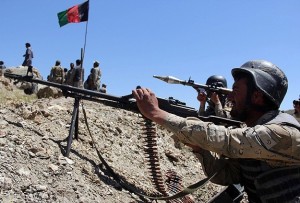
Due to a number of reasons, in 2007, the control in Malakand and Swat was taken by the right-wing religious group – Movement for the Establishment of Sharia (MES), which included the group of the Taliban Movement of Pakistan (Swat) (TMP S). At the time, its field commander was the little-known Mullah Fazlullah (the leader of the Taliban Movement of Pakistan since November 2013). The militants controlled much of the region, and conducted a brutal campaign of violence against the local population for two years. Local law enforcement forces were no longer able to enforce law in the region. In the spring of 2009, the army started a full-scale military operation, and only in July 2009, as a result of a series of military operations, it took control in the region and cleared the area of militants. Some militants were killed, some were taken prisoners, and many fled to Afghanistan, including Mullah Fazlullah. More than 20,000 soldiers were killed.
Individual army units remained in the region to restore the infrastructure in Swat (in collaboration with the civil administration): to reconstruct schools, hospitals, roads and bridges; centers for de-radicalization of the former rebels were opened. During 2009-2013, the army performed the task of maintaining security, partially performing the administrative functions of local authorities.
After his coming to power in May 2013, the new prime minister Mian Muhammad Nawaz Sharif took the course involving the “reduction” of the army’s role in the political life of the country, administering individual regions, etc. Several months ago, the political leadership required the army generals to withdraw their troops and transfer control to civilian authorities. The army obeyed. In fact, the prime minister’s words about the withdrawal of troops from Swat were fulfilled in late 2013 – early 2014, under the new Chief of Army Headquarters General R. Sharife, which heralded in a new trend. The prime minister said that he would promote the maintenance of security in the areas of Buner, Shangla, Dir, Malakand and neighboring regions.
The federal authorities did not even raise the question of a complete withdrawal of troops from Malakand/Swat. Moreover, in accordance with the decision of the prime minister, they started to deploy the military base while transferring administrative functions to local authorities. The experience of military campaigns in Pakistan shows that the administration of territories/regions/districts, etc. is actually performed by the army during the recovery and post-recovery periods, as there is no other functioning administration there.
The military presence in the region (under constitutional law) is the requirement of the times, and it is dictated by several factors:
– the local police and authorities showed that they were not able to oppose alone the actions of militants, who continued their terrorist activities in Swat and other areas of Malakand;
– the appointment of Mullah Fazlullah (native of Swat) to the position of head of the Taliban Movement of Pakistan in November 2013, and his return to his homeland intensified the anti-state elements in the region. There were talks about the revival in the valley again of the Movement for the Establishment of Sharia, defeated by the army in 2009.
Thus, the military base of the federal forces is designed to act as an outpost on the path of Afghani and foreign militants. The withdrawal of coalition troops from Afghanistan in 2014 and the subsequent potential social chaos in the neighboring country will provoke a wave of cross-border aggression into the internal regions of Pakistan through the agencies of Pashtun tribes. Under these conditions, it is assumed that this military corps in Swat will stand in their way.
Militants carried out a series of terrorist attacks against the military in the northern regions in December 2013 – early 2014. In response, the federal army carried out military operations in the agencies of South Waziristan and Khyber. There were new attacks in late January – a convoy of security forces was blown up by an improvised explosive device in Balochistan, and a terrorist attack was carried out near the Pakistan Army Headquarters in Rawalpindi. The political and military leadership of the country decided to continue attacks on the hideouts of militants and their military training camps located in the tribal zones, to increase the security along the border with Afghanistan, including aerial surveillance of the border zone.
The permanent deployment of troops involves newly formed armored units, artillery, infantry and small arms that are primarily intended for combat operations against a regular army of an external aggressor. By establishing a new military base within the distance of a forced march from the capital, Islamabad admits that the region is inadequately controlled from the center by the authorities or internal security agencies, particularly by the Ministry of Internal Affairs of Pakistan, and that is why it has moved to more decisive actions, including a mechanism for forcible enforcement of law in the internal areas of the country.
Natalia Zamarayeva, PhD in History, Senior Research Fellow in the Pakistan Department at the Institute of Oriental Studies, exclusively for the online magazine “New Eastern Outlook”.
